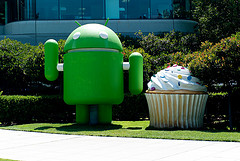Is the Success of Google's Android a Threat to Free Software?

When Google first announced its Linux-based Android mobile phone platform just over two years ago, many were sceptical. After all, the reasoning went, the world of mobile phones is very different from that of computers. Similar doubts greeted the first Android phone, the HTC Dream (also known as the T-Mobile G1), when it appeared last year. But something strange has happened in the last twelve months, with a growing chorus of approval for the Android platform and its phones.
For example, numbers are emerging that suggest that Android has established a real beachhead in the mobile market:
Google’s open-source Android operating system accounted for more than one in four of the smartphone ads served in November by AdMob, the mobile ad network that Google agreed to buy for $750 million six weeks ago. That’s up from 20 percent in October.
That means Apple’s iPhone, which seemed untouchable only a few months ago, has a fast-rising competitor. Apple’s share of ad requests is twice as big — 55% — but Android traffic is eating into iPhone growth, rather than being pushed aside by the iPhone as happened to Nokia.
It's also striking that there is now a palpable sense of excitement around some Android phones, notably Motorola's Droid and HTC models like the Hero (disclosure: I've recently bought one of these). This may not quite be at the level of the mindless worship enjoyed by the iPhone, but it's getting surprisingly close. For example, here are some figures on the sales of the Droid:
The Motorola Droid is doing more than just bashing the iPhone -- it's also smashing the ceiling when it comes to mainstream Android appeal. A full 250,000 people snatched up Droids during the phone's first week in stores, some newly released data suggests. That's four times the number of launch-week sales estimated for the myTouch 3G, which had previously been considered the fastest-selling Android device.
…
So where does the Droid fall within the smartphone spectrum? According to Flurry, Droid's 250,000 figure puts it well above the myTouch, but well below the iPhone. The firm says 60,000 myTouch 3G handsets were sold during its launch week, while 1.6 million iPhones went out during its first seven days.
The same article puts those numbers in context:
Yes, the iPhone's sales figure is significantly higher than the Droid's. But don't forget a couple of important factors:
First, the iPhone 3GS was building upon a massive base of existing iPhone owners, many of whom were guaranteed to be grabbing at Apple's updated model (or, let's be honest, practically anything new Apple offered) the second it hit store shelves. Droid didn't share this advantage; it was a first-generation product without an established fanbase.
Second, and equally noteworthy, the iPhone 3GS launched in eight countries during its first week. The Droid launched only in America. Taking that into consideration, the difference in sales suddenly doesn't seem quite so overwhelming.
And remember: these are *Linux*-based systems that lots of ordinary users are getting worked up about; that's really something quite new and important.
Finally, and just as critically for the future success of the platform, it's worth noting that it's not just the users who are waxing enthusiastic about the Android phones: developers are starting to code for it in big numbers too. Figures from Androlib.com show a healthy upward-trending graph for the number of apps in the Android market. Just how good those apps are (many are feeble), and whether the current figure of 20,000 is completely accurate (Google says it isn't) is largely beside the point: what's important is that the number has doubled in just a few months, which indicates a growing interesting in the platform.
And that's where the problems start. As far as I can tell, the majority of these apps are closed source - it's not something that is flagged up much, but, symptomatically, the Google Android Developer Challenge doesn't require entries to be open source. Which suggests that we are seeing the rise of something that should concern everyone in the free software world: a popular system built on top of Linux, but running closed-source apps.
It already looks increasingly likely that the world of smartphones will be dominated by two platforms: the iPhone and Android. If, as some believe, Google does come out with its own branded mobile, this will give an even greater impetus to Android's uptake. But while the vast majority of the its apps are closed source they will not help spread real user freedom, or offer much of an alternative to Apple's tightly-controlled approach.
Worse, if efforts to enable Android apps to run on distros like Ubuntu succeed, then we may see closed-source software being used on the free software stack there, too. Ironically, Android's success could harm not just open source's chances in the world of mobile phones, but even on the desktop.
The free software community needs to address these problems by encouraging many more developers to build great Android apps that are truly free. In fact, we have an excellent example of how to do that with the rich ecosystem of Firefox add-ons that are free software. Moreover, this should be an attractive challenge to ambitious coders given the exciting possibilities that mobile offers for new kinds of programs (and not just those based on trendy areas like augmented reality). Maybe the time has come to shift the emphasis away from trying in vain to conquer the legacy desktop, towards excelling on mobile, likely to be the main computing platform for most of humanity.

